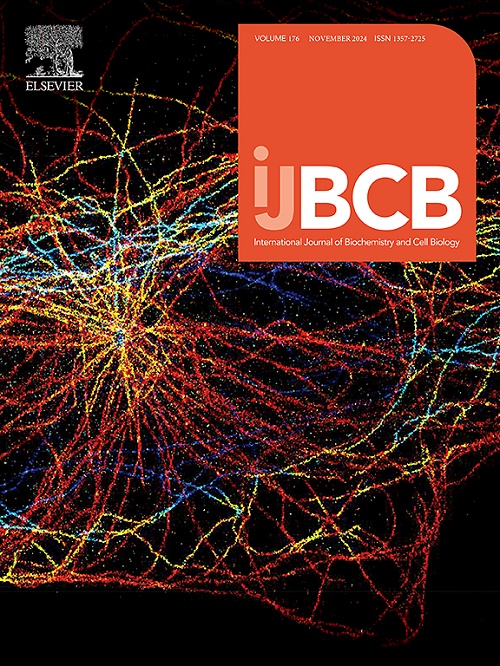Critical role of argininosuccinate lyase in TAp73-mediated proliferating tumor cells
IF 2.8
3区 生物学
Q2 BIOCHEMISTRY & MOLECULAR BIOLOGY
International Journal of Biochemistry & Cell Biology
Pub Date : 2025-05-16
DOI:10.1016/j.biocel.2025.106803
引用次数: 0
Abstract
The dysregulation of the urea cycle resulting in an excessive buildup of ammonia is identified as a pivotal mechanism driving tumor progression. In particular, argininosuccinate lyase (ASL) is crucial for cancer cell proliferation, cleaves argininosuccinic acid to produce arginine and fumarate in the urea cycle. However, the mechanisms controlling ASL expression in cancer cells remain unclear. Herein, we found that TAp73, a transcription factor within the p53 family, regulates the urea cycle pathway in tumor cells with mutant or null p53. Deletion of TAp73 led to increased accumulation of ammonia and changes in urea cycle metabolites. Subsequent experimentation involving the suppression of TAp73 substantiated its pronounced capability in impeding tumor proliferation and tumorigenicity in both in vitro and in vivo settings. Chromatin immunoprecipitation revealed that TAp73 could bind to specific sequences in the ASL promoter, thus promoting ASL expression, increasing intracellular arginine, and reducing ammonia levels. This investigation undertook a clinical scrutiny of TAp73 expression levels in tumor patients' transcriptomes, revealing an inverse relationship between TAp73 expression and patient survival. These results suggested that TAp73 led to abnormalities in the urea cycle by enhancing ASL expression and will be an important factor in promoting tumor proliferation and a potential target for tumor drugs.
精氨酸琥珀酸裂解酶在tap73介导的肿瘤细胞增殖中的关键作用。
尿素循环的失调导致氨的过度积聚被认为是驱动肿瘤进展的关键机制。特别是,精氨酸琥珀酸裂解酶(ASL)对癌细胞增殖至关重要,它在尿素循环中裂解精氨酸琥珀酸生成精氨酸和富马酸盐。然而,在癌细胞中控制ASL表达的机制尚不清楚。本文中,我们发现p53家族中的转录因子TAp73在p53突变或缺失的肿瘤细胞中调控尿素循环通路。TAp73的缺失导致氨积累增加和尿素循环代谢产物的变化。随后的实验涉及抑制TAp73,证实了其在体外和体内环境中阻碍肿瘤增殖和致瘤性的显著能力。染色质免疫沉淀显示,TAp73可以结合ASL启动子中的特定序列,从而促进ASL表达,增加细胞内精氨酸,降低氨水平。本研究对肿瘤患者转录组中TAp73的表达水平进行了临床观察,揭示了TAp73表达与患者生存之间的反比关系。这些结果表明,TAp73通过增强ASL表达导致尿素循环异常,可能是促进肿瘤增殖的重要因素,是肿瘤药物的潜在靶点。
本文章由计算机程序翻译,如有差异,请以英文原文为准。
求助全文
约1分钟内获得全文
求助全文
来源期刊
CiteScore
8.10
自引率
0.00%
发文量
124
审稿时长
19 days
期刊介绍:
IJBCB publishes original research articles, invited reviews and in-focus articles in all areas of cell and molecular biology and biomedical research.
Topics of interest include, but are not limited to:
-Mechanistic studies of cells, cell organelles, sub-cellular molecular pathways and metabolism
-Novel insights into disease pathogenesis
-Nanotechnology with implication to biological and medical processes
-Genomics and bioinformatics

 求助内容:
求助内容: 应助结果提醒方式:
应助结果提醒方式:


